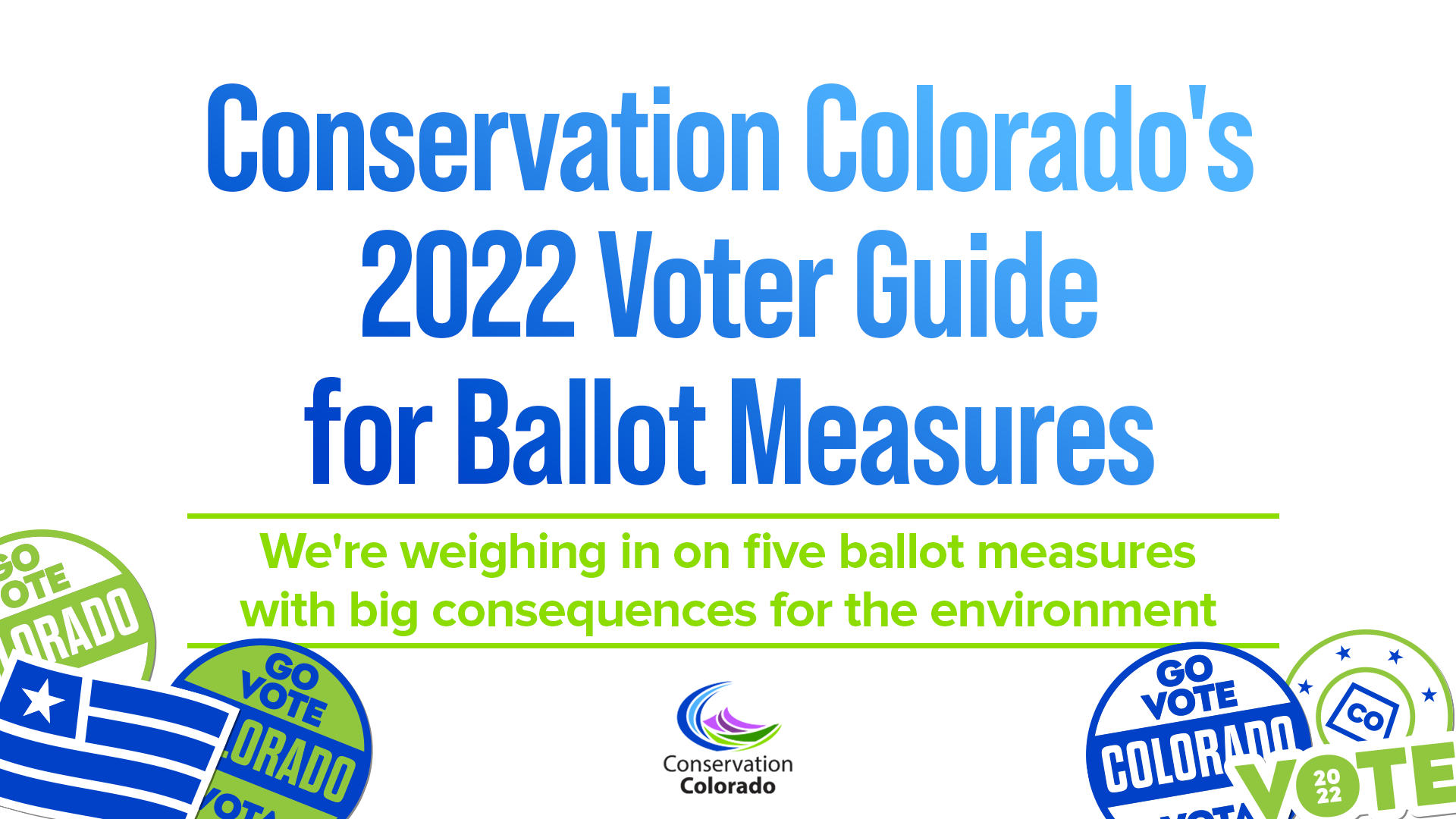The 2022 midterms on Nov. 8 will be critical for determining our environmental future. In addition to choosing our next leaders, Colorado voters also have the opportunity to weigh in directly on several ballot measures. This year, Conservation Colorado has taken positions on five ballot measures that will have consequences for our climate, lands, air, water, and communities. Three are statewide, and two are specific to Denver.
Our leadership is also at stake, and Colorado needs pro-conservation leaders who will act on climate change, protect public lands and wildlife habitat, secure our water supply, and clean up our air. You can find out which candidates Conservation Colorado has endorsed here.
If you enjoy the privilege of being able to vote in Colorado, YOU can have a say in these important decisions. Make a plan to vote and turn in your ballot by Nov. 8. Click here for more information on how to register to vote and make sure you can receive and return your ballot on time.
Quick summary:
- Yes on Proposition GG
- No on Proposition 121
- Yes on Proposition 123
- Yes on Denver Ballot Measures 306
- Yes on Denver Ballot Measure 307
Statewide Ballot Measures
Vote yes on Proposition GG

Colorado’s restrictive “Taxpayer Bill of Rights” (TABOR) has stalled the state’s ability to make progress for too long. Proposition GG helps by requiring more transparency on ballot measures. Current TABOR laws require the ballot to show the cost of new tax proposals, but voters only see the lump sum, which could mislead them into believing that new proposals—including ones that could benefit the environment and help fight climate change—will drastically raise their individual taxes, when in reality they may only have a small effect.
Proposition GG will require that any ballot measure asking voters to approve a change to the state income tax include a simple table showing the change in average tax for households at different income levels.
Vote yes to support giving voters a fuller picture of taxes in Colorado.
Vote no on Proposition 121

This measure would reduce the state income tax rate from 4.55% to 4.40%. It’s backed by the right-wing Independence Institute as part of an effort by conservatives to gradually abolish the state’s income tax.
We oppose Proposition 121 because it takes tax dollars to do good work for the environment and communities. This measure would cut into funding for state agencies like the Colorado Department of Public Health and the Environment, Department of Natural Resources, and the Colorado Energy Office. Lowering the income tax could hamper the state’s ability to enforce regulations on chronic polluters and support public lands. Additionally, a legislative analysis found that higher-income earners would get the most benefit in tax savings—meaning the change would only further economic disparities in Colorado.
Vote no to make sure essential state services, including those for the environment, stay funded.
Vote yes on Proposition 123

According to the National Low Income Housing Coalition, Colorado is the ninth least affordable state for housing. Home prices have doubled in the last 10 years, while wages have remained stagnant.
When people are priced out of the places they work, it leads to higher transportation emissions from longer commutes. Sprawling development encroaches on open space and wildlife habitat. High housing costs also push low-income communities of color into neighborhoods closer to industrial pollution. For these reasons, we must increase our supply of affordable housing to effectively fight climate change and advance environmental justice.
Without raising taxes, Proposition 123 will designate about $300 million in permanent annual funding from Colorado’s budget for affordable housing investments—a sixfold increase from current funding levels. The funding will support affordable housing that is more sustainable, including dense and transit-oriented development. It will also fund programs to reduce homelessness and increase access to homeownership.
Vote yes for an important step towards tackling the climate, affordable housing, and racial justice crises.
Denver Ballot Measures
Vote yes on Initiated Ordinance 306

Recycling and composting help conserve water and energy, reduce methane emissions from landfills, enrich soils, and fight climate change. But not everyone can access these services. Many apartment complexes, businesses, and events in Denver currently don’t have recycling and composting services on site. In 2020, nearly 1 million tons of Denver’s waste went to the landfill. Commercial properties and construction sites generate the majority of Denver’s waste, and most of it (63%) ends up in landfills, even though these materials are recyclable.
Ballot measure 306 would require all businesses — including apartment buildings, condos, restaurants, hospitals, hotels, and sporting arenas, and permitted events—to provide compost and recycling pickup services alongside trash services. It will also require that construction demolition waste be sustainably managed.
Vote yes for a city in which everyone has the opportunity to recycle and compost.
Vote yes on Initiated Ordinance 307

A connected sidewalk system is the backbone of a climate-friendly city. People need adequate, functional sidewalks to get around without using a car. But many of Denver’s sidewalks are in disrepair. Thirty percent are too narrow to accommodate a person in a wheelchair or a parent with a stroller. In some neighborhoods, there are no sidewalks at all. And the distribution of good sidewalks is unequal – 47% of streets in low-income areas have missing or substandard sidewalks.
Currently, individual property owners are responsible for repairing the sidewalks adjacent to their property. Under one estimate, it would take Denver 400 years to build out a complete sidewalk network with current funding levels. Ballot measure 307 would establish an annual fee on property owners to fund sidewalk repair in a more effective and equitable way.
Vote yes to help Denver increase walkability, reduce climate emissions, and support livable neighborhoods.
To see our full list of endorsements for statewide offices, State House, State Senate, and County Commission, click here!






